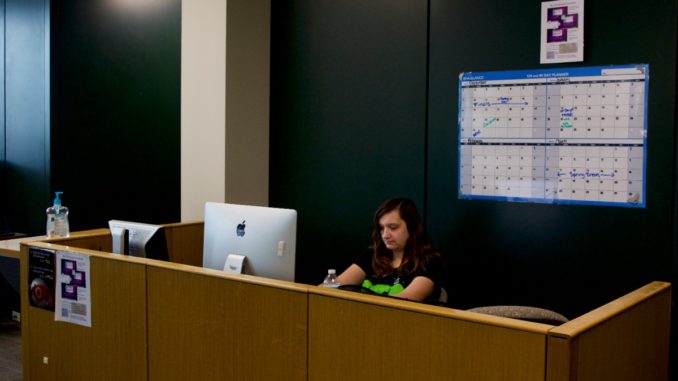
Students at Truman State University can apply for a scholarship job that maintains the same criteria this semester even under the COVID-19 adjustments that have been made.
Students across campus are facing the challenges of fulfilling their job requirements in a health-conscious manner. On top of this, a shortened semester means slightly less time to complete 58 hours for students.
Financial Aid Director Marla Fernandez oversees the scholarship hours processes at Truman, and went into detail about the math behind the scholarship requirement.
“We typically divide the 58-hour requirement over 15 weeks which is 3.87 hours per week,” Fernandez said. “With the shortened time period it’s 14 weeks at 4.14 hours per week which is still achievable for the students.”
Fernandez explained that last semester’s decision to waive the hours required for students was primarily based on the inability of students to come back to campus to work.
One obstacle with having scholarship hours during this semester is the inability to attend work due to precautionary actions such as quarantining.
Fernandez assured that there was a way to still complete the hours requirement even in the presence of missed hours.
“If, for some reason, students are sick or are required to quarantine during the semester and can’t complete some of their scholarship hours, we ask them to email [the Financial Aid Office],” Fernandez said.
Junior Dara Fitzmaurice is currently employed as a math proctor in Violette Hall, where she checks-in students and enters passwords to set up tests for those who have to take them. Fitzmaurice commented on the stress that the new COVID-19 guidelines have had on the student test-takers.
“I think it has become more stressful for the students taking exams because there are fewer seats available in the testing center,” Fitzmaurice said. “So if it’s full, they have to wait in line now.”
The testing center has been accommodating to the student body during years past, but the limited seating is among many new rules for the testing center this semester.
Along with social distancing protocols within the center, Fitzmaurice mentioned that all testing materials and computer stations are sanitized between each tester.
Maya Bat-Ireedui, Academics Success Mentor coordinator for the Center for International Students, acknowledged the presence of COVID-19, but said that the department has planned ahead in the event of an all-online semester.
“Right now everything is over Zoom,” Bat-Ireedui said. “The students that I work with also feel that over Zoom meetings are the safest way to meet.”
Bat-Ireedui assists international students with adjusting to life in America once they arrive and also has weekly meetings with students where information is provided for their academic and overall life success.
“This job is very important to the students involved. Luckily, if everything were to go online, the program would still be able to function,” Bat-Ireedui said.
The sustainability of the ASM motivates Bat-Ireedui to continue to adjust during her first year with the position even amid the pandemic.
